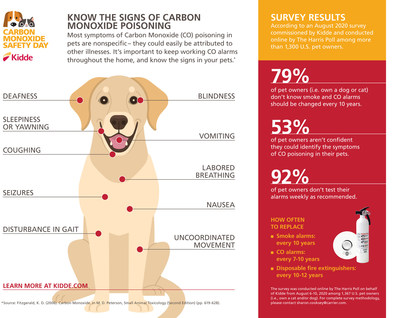Survey: Majority of U.S. and Canadian Pet Owners Unable to Identify Symptoms of Carbon Monoxide Poisoning in Their Pets
MEBANE, N.C., Sept. 17, 2020 /PRNewswire/ -- Pets are popular in North America, with a large percentage of households (
Just like any other member of the family, pets are susceptible to CO poisoning. However, according to a new survey commissioned by Kidde and conducted online by The Harris Poll among over 1,300 U.S. pet owners and over 500 Canadian pet owners,
Moved by this data, Kidde has recognized Sept. 17 as the first-ever National Pet Carbon Monoxide (CO) Safety Day to raise awareness about the dangers of this colorless, odorless and tasteless gas, which can prove fatal to people and pets. As part of Carrier's Healthy Homes Program, Kidde is sharing important advice on how to help protect the people and pets in your home:
- Install CO alarms throughout the home. CO can travel anywhere in the home – even through drywall – so most often, one alarm is not enough. It's best to install CO alarms throughout the entire home with at least one on every level, and consider including in living areas, bedrooms and hallways outside sleeping areas.
- Know the signs. Common signs of CO poisoning in pets include nausea/vomiting, dizziness or labored breathing, among others. If your alarm sounds or you suspect CO in your home, leave your home immediately and call 911.
- Replace alarms after 7-10 years, depending on the model. While testing alarms once a week and ensuring batteries are replaced are critical steps, replacing every alarm at a minimum of 7-10 years is paramount. In case you cannot remember the date you installed your alarms, simply check the manufacturing date – commonly located on the back of the alarm – and add 7-10 years, depending on the model. Please check your manufacturer user guide.
- Regularly inspect appliances. CO sources include natural gas, kerosene, propane, coal and gasoline. Have appliances checked regularly to ensure they're properly installed and not malfunctioning. Also, never use generators or grills indoors, or run any fuel-burning appliances in an enclosed garage (even with the door open.)
Additional findings of this survey revealed an opportunity to continue educating U.S. and Canadian pet owners about the dangers of CO:
79% (U.S.) and71% (Canadian) do not know smoke and CO alarms should be replaced every 7 to 10 years, depending on the model.- Only
6% (U.S.) and only4% (Canadian) test their smoke alarms the recommended amount of once a week or more often.
"These poll findings shine a light on the need for more education and awareness around the dangers of CO in our homes – for both people and pets," said Brad Nohr, managing director, Kidde. "National Pet Carbon Monoxide Safety Day highlights how people can recognize the symptoms of CO poisoning in their pets and how they can use CO alarms to help keep the entire family safe. To help protect your family, ensure that working CO alarms are installed throughout your home."
For more than 100 years, Kidde has been a leading manufacturer of residential smoke alarms, CO alarms and fire extinguishers. In addition to delivering advanced fire safety technology, Kidde strives to keep communities safe through educational initiatives, community donations and awareness campaigns. On National Pet Carbon Monoxide Safety Day – and every day – Kidde stands firmly as an advocate for lifesaving fire safety education and prevention.
For more information, visit kidde.com/pet-safety.
About Kidde
Kidde, a leading manufacturer of residential smoke alarms, carbon monoxide alarms, fire extinguishers, and safety accessories, has been keeping the world a safer place for over 100 years. Kidde produced the first integrated smoke detection system a century ago and continues its legacy today by delivering advanced fire-safety technology. Kidde is a part of Carrier Global Corporation, a leading global provider of innovative HVAC, refrigeration, fire, security and building automation technologies. For more information, visit kidde.com or follow @KiddeSafety, and on Facebook and Instagram.
Survey Method
The U.S. survey was conducted online by The Harris Poll on behalf of Kidde from August 6-10, 2020 among 2,051 U.S. adults ages 18 and older, among whom 1,367 are pet owners (i.e., own a cat and/or dog). The Canada survey was conducted online by The Harris Poll on behalf of Kidde from August 14-17, 2020 among 1,004 Canadian adults ages 18 and older, among whom 538 are pet owners (i.e., own a cat and/or dog). These online surveys are not based on a probability sample and therefore no estimate of theoretical sampling error can be calculated. For complete survey methodology, including weighting variables and subgroup sample sizes, please contact Sharon Cooksey at sharon.cooksey@carrier.com.
Contact:
Sharon Cooksey
919-612-0583
sharon.cooksey@carrier.com
![]() View original content to download multimedia:http://www.prnewswire.com/news-releases/survey-majority-of-us-and-canadian-pet-owners-unable-to-identify-symptoms-of-carbon-monoxide-poisoning-in-their-pets-301133382.html
View original content to download multimedia:http://www.prnewswire.com/news-releases/survey-majority-of-us-and-canadian-pet-owners-unable-to-identify-symptoms-of-carbon-monoxide-poisoning-in-their-pets-301133382.html
SOURCE Kidde








